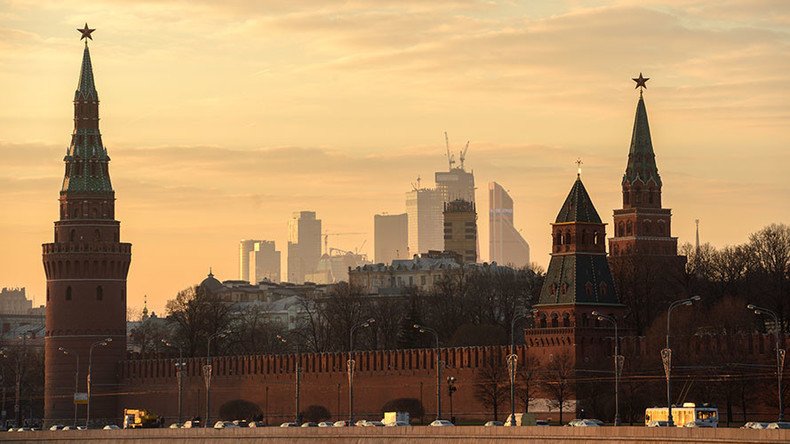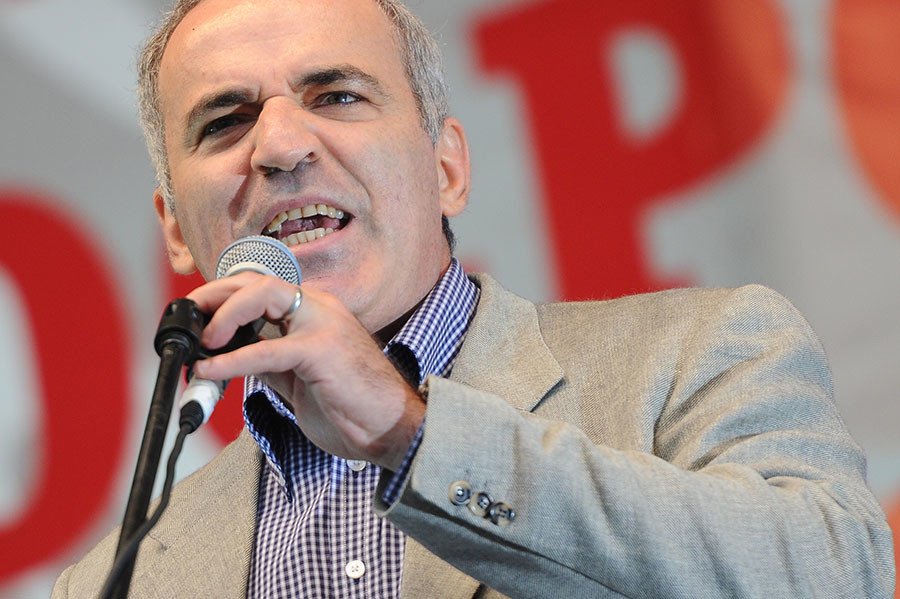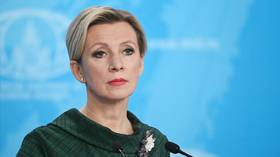Spring’s Holy Trinity: How every ‘anti-establishment’ vote is now Russia’s fault

According to the Western media establishment, Russia is now responsible for every electoral defeat of their favored candidates or positions. Their own performance is entirely irrelevant.
Children of the 1970s and 1980s may remember the ‘Schoolhouse Rock’ melody, ‘Three Is A Magic Number.’ Aside from it being a catchy tune, it’s hard to argue with the notion that three is a special digit. After all, the Christian Church was essentially founded on the doctrine of the Holy Trinity - the Father, the Son, and the Holy Ghost.
Here in Russia, there’s even a unique word for things that come in threes: “troika.” This term is now known across all of Europe, as it is associated with the European Commission, the European Central Bank, and the International Monetary Fund’s imposition of austerity on Greece, Ireland and Portugal.
This spring, there’s a new triumvirate in town: a triad of electoral issues that anti-Russia activists – and the Western media they increasingly influence – believe Russia is manipulating. First, Moscow was accused of forcing Dutch people to reject a free trade agreement with Ukraine, despite exit polls showing that Russia had little or no influence on the ballot.
Pro-EU propaganda has also found a Russian angle to Brexit. Essentially, the new argument is “don’t vote to leave the EU because that is what Putin wants.” This is, of course, despite the likelihood that a British exit from the EU probably wouldn't be in Russia's best interests. After all, it would strengthen NATO and increase German dominance in Brussels. Putin would hardly be dancing a jig over either scenario.
It’s happening in America, too. Politico wants us to believe that Donald Trump is “the Kremlin’s Candidate.” While the headline is pretty much crude ‘clickbait,’ the article itself amounts to a hatchet job on RT and a long-winded attempt to smear Ed Schultz, its news host. Schultz was a liberal darling until a few months ago, when he joined RT. Since then, he's apparently morphed into the devil's spawn.
Sloppy Copy
Written by Michael Crowley, the Politico diatribe attempts to plant the idea of a sinister friendship between Putin and Trump. But the journalism is sloppy. For instance, it misquotes the Russian president, suggesting that he described Trump as “an outstanding and talented personality.” Putin never actually said this. When cornered by a reporter after a press conference and asked about Trump, he called him a “yarky chelovek.” (“Он яркий очень человек.”) “Outstanding” is a completely erroneous translation. “Vivid” or “garish” would be more correct. So Putin basically described Trump as a “big (vivid) personality.” That is hardly a ringing endorsement. As it happens, the noted Russian-English translator, Michele Berdy, explains that “basically, Putin called Trump a standout kinda guy.”
Politico accuses RT of favoring Trump in the US presidential campaign. For anyone who has observed American coverage of Russian politics in the past couple of decades, this is a genuine laugh-out-loud moment. From the New York Times to the Washington Post and Time to Newsweek, US outlets have long been united in hatred of Putin and homogeneous in fawning admiration of Russia’s pro-Western “liberals,” who are presented as champions of democracy. This is despite the fact that, unlike Trump, they have very little popular support in their country. In Russia, these guys are mostly regarded as relics of the 1990s – which was, without question, the worst decade in Russia's modern history.
Politico itself has pushed Russian opposition figure Garry Kasparov for years. While he’s kind of famous in America these days, he's more or less been forgotten in Russia. A recent Levada poll suggested that 75% of Russian voters have never even heard of the former chess player.

Regime Change
Indeed, American media accusing any Russian outlet of political bias is staggering in its mendacity. Back in 2013, US government officials literally pranced around Kiev calling for the removal of a corrupt, but nevertheless democratically-elected president. And who were the chief cheerleaders? The (nominally independent) Western media. In fact, outlets just like Politico – which has continued to passionately support the Maidan movement ever since.
While Politico is concerned about perceived foreign media support for Trump potentially influencing the US election, it doesn’t appear to worry about the opposite side of the coin – that is, foreign media lambasting him. Here’s a sample from the British press.
Let’s start with the Financial Times: “Mr. Trump is a promoter of paranoid fantasies, a xenophobe and an ignoramus. His business consists of the erection of ugly monuments to his own vanity,” wrote Martin Wolf in March. Meanwhile, over at the Independent, Rupert Cornwell didn’t hold back either: “He’s a nativist, a mercantilist and a neo-isolationist, who is not afraid to turn long-term allies into enemies.” At the same time, the Guardian has been ridiculing Trump for his hair and the behavior of his family. Politico has nothing to say about these takedowns.
Then there is American coverage of Russia, which rarely involves any sort of reasoned analysis and blurs the lines between propaganda and journalism. Instead of balanced reportage, it offers stuff from the comic book tradition. It’s all about “goodies” and “baddies.” For example, serious Russia watchers know that one of the most prominent opposition leaders, Alexey Navalny, has expressed beliefs that are firmly in the realm of hard-core nationalism and outright racism. Yet, US media presents him as some kind of secular saint. The attitude seems to be that anything can be forgiven, so long as a person opposes Putin.
Under Uncle Sam's Thumb
This black and white presentation of Russian issues goes back a long way. In the mid-‘90s, when Russia was essentially collapsing, American journalists backed the Yeltsin government to the hilt. Under Yeltsin’s watch, life expectancy for men fell to 58, Russia had the most rapid HIV growth rate in the world, and the population loss outpaced the Stalin era. Yes, you’ve read that right: demographically, Russia suffered greater proportional losses under Yeltsin than under a man considered to be one of the most tyrannical rulers in history. The country became so devoid of hope that in 1998, Russian high school students ranked ‘prostitute’ and ‘hired assassin’ above ‘scientist’, ‘engineer’ and ‘researcher’ as attractive career choices.
Yet the US media just couldn’t praise Yeltsin highly enough. In 1996, the incumbent faced the Communist candidate Gennady Zyuganov in a tightly contested election. It was an open secret that the ballot was rigged. In point of fact, even the OSCE’s mission chief, Michael Meadowcroft, admitted it – but only years after the Washington-friendly election results were allowed to stand.
However, American outlets not only ignored the fraud, they helped cover it up. The Washington Post gleefully smeared Zyuganov as a Stalinist, while the New York Times called the result “a victory for democracy.” American correspondents in Moscow were fully aware that whole districts had apparently voted almost unanimously for Yeltsin, yet reported no suspicions. Years later, Meadowcroft said: “In Chechnya they’d been bombed out of existence, and there they were all supposedly voting for Yeltsin. It’s like what happens in Cameroon.”
In July 1996, Time Magazine went further. It openly celebrated how American advisers had stepped in to ensure Yeltsin won the election. Now, 20 years later, the American media is publishing alarmist articles about their Russian counterparts allegedly favoring a US election candidate.
Let’s just think for a moment here. Trump has stated that he wants “to get along with Russia.” On the other hand, Clinton has compared Putin to Hitler. She’s also called for even more anti-Russia sanctions. Surely, it’s blindingly obvious that no Russian would support her in such circumstances?
Even Putin’s welcome of Trump’s comparatively moderate stance toward Russia is apparently an entirely inappropriate reaction in the Western media’s eyes. Yet, at the same time when the US president travels across the ocean to openly advocate against Brexit, they raise no objections.
In any case, Moscow's influence on the US election is negligible, just as its clout on Brexit is trivial and its impact on the Dutch EU referendum was slim. This Holy Trinity of scaremongering is so removed from reality as to be beyond ridicule.
The ‘blame Russia’ roadshow won’t end until such time as the Western elite has a government it favors in the Kremlin. The hopes, dreams and wishes of the Russian people don’t amount to a hill of beans to the likes of Politico.
The statements, views and opinions expressed in this column are solely those of the author and do not necessarily represent those of RT.














